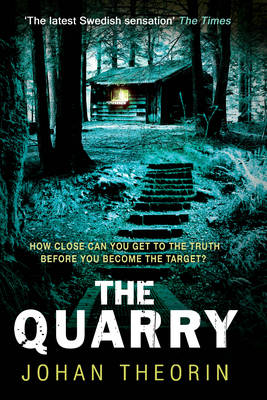
EURO CRIME
Reviews

Theorin, Johan - 'The Quarry' (translated by Marlaine Delargy)
Trade Paperback: 416 pages (June 2011) Publisher: Doubleday ISBN: 0385619294
In this wonderful book set on the small Swedish island of Oland, old Gerlof decides that he's had enough of assisted living, in which his fellow residents' main activity is waiting to see who will be next to be wheeled out on a stretcher to the hospital or funeral home. Eventually he persuades the authorities to let him go and live in his old cottage in a small hamlet near the titular quarry. Very few inhabitants remain, but Gerlof is happy to sit in the garden and watch the approaching spring, thinking about the past while he reads his late wife's secret diaries found hidden behind the stove. Gerlof's wife died 20 years ago, at that time telling him about the diaries but asking him to destroy them without reading them, so Gerlof feels a sense of guilt at disobeying her wishes - but as we know he is an insatiably curious person.
The old village is gradually being taken over by newly built, luxury second homes, one of which is owned by Vendela and her odious husband Max who arrive there at the start of the novel in a dramatic fashion. Vendela is an unstable woman, possibly addicted to diet and herbal pills. She's bullied and patronised by her husband, but quietly carries on with her running on the alvar, walking her old dog, and her gardening, as well as being chief author of "his" books. Vendela grew up on the island; her memories of her harsh childhood at a nearby farm (now also converted into a luxury home) are interspersed with a sense of impending tragedy as well as an element of the supernatural, as the young Vendela gave gifts to the elves in order to have her wishes come true, and she's spent her adult life enmeshed in the topic.
Another local resident is Per, a divorced father of two who works in market research. He isn't particularly well off but has inherited a cottage from a relative (Ernst, a friend of Gerlof's in ECHOES FROM THE DEAD, first novel in this quartet, though you don't need to have read the previous novels to enjoy this one). Per has come to stay there for the summer with his teenage son while his daughter Nilla is in hospital on the mainland with an undiagnosed but serious illness. Together the father and son start to make some limestone steps down into the quarry, where the trolls (ancient enemies of the elves) are said to have lived.
Per's terrified but unarticulated concern for his daughter underpins his musings on his life and in particular his relationship with his father, "Jerry", who abandoned him and his mother when Per was a young boy. Jerry is now old and failing after a stroke; though he lives on his own he constantly rings Per who feels an obligation to keep an eye on the old man. Not only was Per abandoned by his father, but it turns out that Jerry was a producer of porn magazines, and later films. Per witnesses an arson attack on Jerry's house, but the police don't seem to be able to get anywhere in determining who was responsible.
The book tells the story of Vendela and Per, both of them lonely people searching for something that they lost when they were children. Vendela's ongoing relationship with the elves and tolerance of Max; and Per's fear of his daughter's diagnosis and memories of stories about the trolls, are counterparts of the way both of them were treated by their own parents in the past.
Gerlof, alone but not lonely, is not the main character of this novel (though the first few chapters in which he is central are just so compelling!), but he is the glue and the spirit that holds it together. Sometimes he is sitting in his garden when someone passes by, so during their conversations he learns some of his neighbours' concerns, and can tell them a few things about the old days when the quarry was a going concern. Sometimes he simply muses on his wife's written account of her life while he, Gerlof, was at sea and their young daughters were away on their bikes enjoying their summer. But though not always present in the novel, he is usually at the bottom of its various plot developments.
There are mysteries aplenty in this book, but one's main experience on reading it is to become totally involved in the old and new ways of life on this small island, and to come to understand the nature of the people who choose to live there - mainly Per and Vendela, both on their separate quests - but also some other visitors and old residents. There is something of a "thriller" climax to Per's search for the truth about his father's life by the end of the book, and Vendela too is forced into a decision with extreme consequences by Max's escalation of his need for control into a very cruel act. But even without these plot elements, I'd have been delighted simply to enjoy this marvellous, insightful story, so sympathetically translated and beautifully, sadly told by an author who is masterly at conveying both a moving elegy for the old times, as well as astutely observing the mores of more modern, understated yet devastating tragedies. I loved everything about this novel, and take heart from its utterly perfect last line.
Maxine Clarke, England
August 2011
Details of the author's other books with links to reviews can be found on the Books page.
More European crime fiction reviews can be found on the Reviews page.